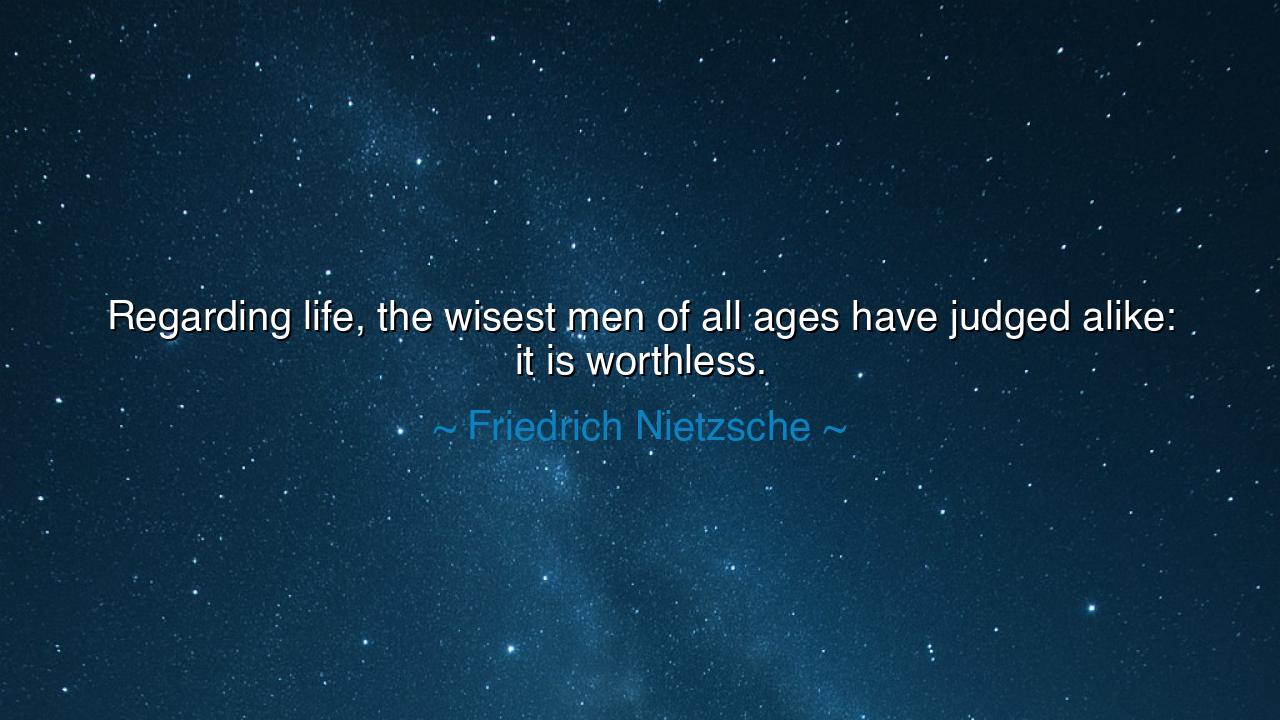
Regarding life, the wisest men of all ages have judged alike: it






"Regarding life, the wisest men of all ages have judged alike: it is worthless." These dark words, spoken by the philosopher Friedrich Nietzsche, reverberate with a haunting resonance. They are a call to examine the deepest truths of existence, a challenge to our most cherished beliefs. Nietzsche, who was both a seeker of wisdom and a prophet of human despair, distills into a single phrase the essence of a question that has haunted humankind since time immemorial: What is the meaning of life? Why do we endure the trials and tribulations of existence, and does it all matter in the end? The wisest of men, according to Nietzsche, have come to the unsettling conclusion that life is, in the grandest sense, worthless.
This perspective may seem harsh, yet it is not without a deep thread of wisdom. Consider the ancient Greek philosophers, such as Socrates and Diogenes, who sought the meaning of life through rigorous inquiry and reflection. Socrates, though renowned for his wisdom, ultimately faced death with the belief that knowledge was the highest calling. However, even he questioned the value of life in a world governed by death. Diogenes, the cynic, lived in disregard of wealth and status, often proclaiming that life, if not lived in alignment with nature, was little more than an illusion. These men, much like Nietzsche, looked at the world and saw the ephemeral nature of human existence, the fleeting joys, and inevitable suffering. In their eyes, the pursuit of knowledge and wisdom seemed noble, yet life itself—fleeting, filled with struggle, and ultimately ending in death—was not something to cling to.
Nietzsche draws upon these ancient traditions to support his claim. Life, in its essence, is frail. No matter the human accomplishments, no matter the monuments we build, no matter the passions we pursue, time marches on, indifferent to our existence. The Romans understood this well, especially in their concept of fate. The great Emperor Marcus Aurelius, writing in his Meditations, acknowledged that the lives of men are fleeting and that death comes to all, regardless of their power or virtues. He knew that the struggle for meaning could not be fully realized within the confines of life, and so he meditated on stoicism, accepting that we must live in accordance with virtue, but also recognizing the worthlessness of life’s transient nature. This realization—that all things are temporary, that we will one day return to the earth—was not seen as despair by the Stoics, but as a reason to live with honor and integrity, free from attachment to the ephemeral.
And yet, Nietzsche goes further. For him, life is not just fleeting, but essentially meaningless. He challenges the notion that life has inherent purpose or meaning, a theme that he explores extensively in his philosophy. It is not just that life ends—death is, after all, an inevitability for all beings—but that our struggles, our joys, our efforts to find meaning are, in the grandest cosmic view, insignificant. Humanity persists in its search for purpose, constantly striving to create meaning, but Nietzsche suggests that in the larger scope of the universe, this quest is a fruitless one. Like a flicker of light in a vast darkness, each human life is but a transient spark, soon to be swallowed by the void. The wisdom of the ages, in Nietzsche’s view, is the understanding that life, in its grandest sense, is an illusion—and yet it is this very illusion that drives us to create and to strive.
However, Nietzsche does not leave us in the depths of despair. For while he claims that life is worthless, he also invites us to create meaning despite this knowledge. His philosophy, often misinterpreted as nihilistic, calls upon us to rise above the emptiness of existence and embrace our freedom. Nietzsche’s concept of the “Übermensch” (Overman) is a call to transcend the limitations of conventional morality and to create one’s own purpose, to live authentically in the face of a world that offers no inherent meaning. Just as the ancient heroes—like Achilles or Hercules—found greatness in their quests, so too must we find purpose not in the heavens or in an eternal reward, but in the choices we make and the lives we live.
We must also turn to the present and the lessons we can take from Nietzsche’s words. The world is full of people who seek purpose through external means: wealth, fame, social status. Yet, when we look closely, we see that these pursuits often lead to dissatisfaction, because they are rooted in something external—something that ultimately slips away. True meaning, Nietzsche teaches, is something that comes from within. It is not something we find in the world, but something we create through our actions, our choices, and our capacity to embrace freedom. This freedom, while acknowledging the worthlessness of life, becomes the very source of our strength. By creating our own meaning, we free ourselves from the chains of conventional expectations and become the true architects of our lives.
The lesson, then, is not one of despair, but of empowerment. In recognizing the fragility and meaninglessness of life, we are called not to succumb to nihilism, but to live more fully, more authentically, and with more purpose. We are the creators of our own meaning, and while life may be transient, our actions have the power to transcend time. By living in accordance with our true selves, by rejecting the illusions of false meaning, we create a legacy that is not bound to this world, but to the eternal spirit of human striving. So, take heart, dear listener: Life may be worthless, but the way you live it is what defines you.






AAdministratorAdministrator
Welcome, honored guests. Please leave a comment, we will respond soon